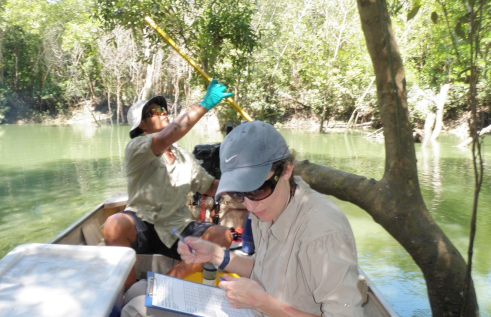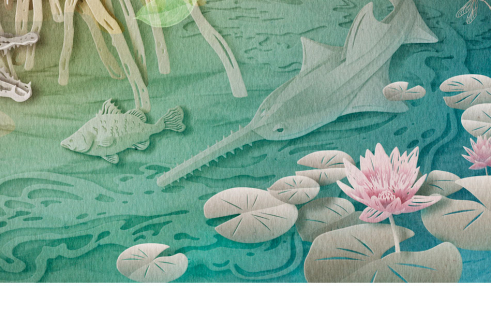Our focus
We study water, sediment and biota microbial quality in marine, coastal and freshwater systems.
Areas of focus include:
- vibrio ecology and shellfish safety
- microbiology of waste water treatment
- microbial source tracking in water (marine, freshwater recreational and drinking water) and associations between water sources and opportunistic pathogens in drinking water.
Specialist expertise and tech
Molecular laboratory including quantitative PCR equipment for targeted gene analysis and whole microbial community profiling. Biostatistics and bioinformatics expertise and infrastructure. Full range of field equipment for sampling and in-situ monitoring of pH, EC, Temp, DO, Turbidity.
Meet the team
Co-leads
Research Assistants
- Alea Rose
- Zarah Tinning
- Dionisia Lambrinidis (Executive Officer)
Contact us
- General executive enquiries: Dionisia Lambrinidis Dionisia.Lambrinidis@cdu.edu.au
- General research enquiries: Karen Gibb Karen.Gibb@cdu.edu.au
- Vibrios, shellfish and algal toxins: Ann Padovan Anna.Padovan@cdu.edu.au
- Drinking water quality and source tracking: Mirjam Kaestli Mirjam.Kaestli@cdu.edu.au
Why this research is important
Our high impact research is protecting the natural assets of the Northern Territory that underpin its economy. We specialise in microbiological and molecular analyses in aquatic and terrestrial environments, including analyses of sediment, water and biota.
Our work supports shellfish food safety, safe drinking water and we use microbial signatures to monitor the footprint of pollution in the environment.
Key achievements and impacts
- Aquatic food monitoring in Darwin Harbour for pathogens and algal toxins to characterise hazards to human health.
- Microbial source tracking of recreational waters such as the Berry Springs Nature Park swimming pools to better understand sources of faecal indicators.
- Drinking water investigations across the Top End to improve the understanding of opportunistic pathogens, biofilms and iron bacteria to assist in developing management guidelines suitable for tropical Australia to minimize microbial risk.
Key projects
- Global Sewage Surveillance Program – collaboration with Technical University of Denmark - National Food Institute DTU & WHO
- Microbiology of a tropical creek impacted by sewage effluent: novel assessment using N-cycle functional markers and changes in community composition - ARC L-P
- Aquatic Foods Monitoring Program for the Ludmilla and Leanyer Sanderson discharges (Darwin Harbour) – Power and Water Corporation (PWC)
- Understanding risks associated with algal toxins in the Leanyer Sanderson discharge and in aquatic foods harvested from Buffalo Creek - PWC
- Leanyer Sanderson Waste Stabilisation Pond Microbiology – CDU and PWC
- Ecology of Vibrio spp. in the wet dry tropics – CDU
- Microbial Source Tracking at Berry Springs Pools – Water Resources Division DENR
- The occurrence of iron bacteria, biofilms and opportunistic pathogens in remote water supplies - PWC
Available postgraduate projects
- Distribution of Vibrio parahaemolyticus in seawater and sediment
- Vibrio ecology and associations with algal blooms
- Faecal markers and microbial source tracking in tropical savannas
Interested in Environmental Microbiology?
Publications snapshot
-

Microbial patterns in a tropical estuary
Read moreThis work has laid the groundwork for further studies to identify bio-indicators suitable for routine monitoring to measure human impacts in complex ecosystems.
Kaestli, M., Skillington, A., Kennedy, K., Majid, M., Williams, D., McGuinness, K., and Gibb, K. (2017). Spatial and Temporal Microbial Patterns in a Tropical Macrotidal Estuary Subject to Urbanization. Frontiers in Microbiology, 8, 1313.
-

Microbiota in remote water supplies
Read moreThis study provided a first snapshot of the microbiota in a selection of remote water supplies informing future studies to ultimately improve management guidelines for water supplies in the wet-dry tropics.
Mirjam Kaestli, M, O'Donnell, M, Rose, A, Webb, J, Mayo, M, Currie, B & Gibb, K 2019, Opportunistic Pathogens and Large Microbial Diversity detected in Source-to-Distribution Drinking Water of three Remote Communities in Northern Australia, PLOS Neglected Tropical Diseases 13(9): e0007672.
-

Assessing marine food safety in a tropical estuary
Read moreDistinctive bacterial communities were found in artisanal harvest shellfish regardless of location but the microbial and metal/ metalloid analysis indicated the shellfish were safe to eat and the data serves as a baseline for future aquaculture.
Padovan, A. C., Neave, M. J., Munksgaard, N. C., & Gibb, K. S. (2017) Multiple approaches to assess the safety of artisanal marine food in a tropical estuary. Environmental monitoring and assessment, 189(3), 125.